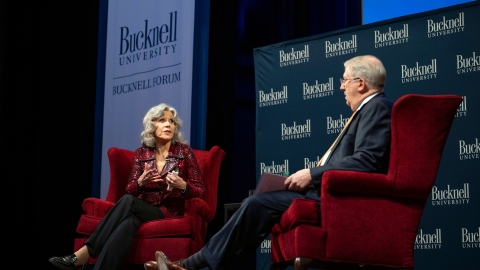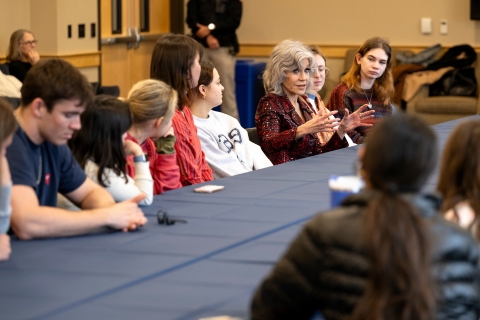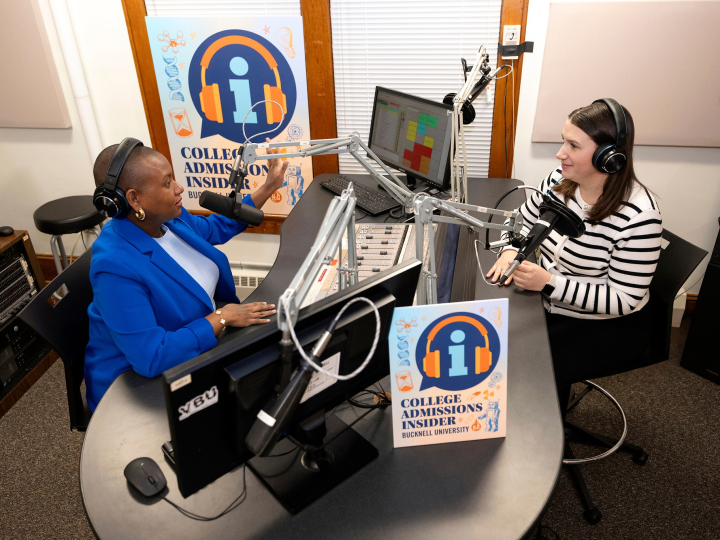
Jane Fonda Discusses the Link Between Acting and Activism
March 20, 2024
Jane Fonda spoke about the theme "Freedom of Expression" with President John Bravman at the Bucknell Forum. Photo by Emily Paine, Communications
Art has the capacity to inspire deep feelings and reveal uncomfortable truths, whether about ourselves or the world around us. However, it is often a matter of personal choice whether those newfound feelings and truths are then transmuted into actions that can change reality and shape the future. For Jane Fonda, art and action are reciprocal forces that have bolstered both her acting career and her activism.
Fonda offered her perspective on the symbiotic relationship between art and activism as the fifth and final speaker in Bucknell's 2023-2024 Forum series, which explores the theme "Freedom of Expression." Following a private question-and-answer session with students from an integrated perspectives class, the award-winning actress joined President John Bravman on the stage of the Weis Center for the Performing Arts on March 19 where they shared a spirited exchange of ideas in front of a spellbound audience.
In a career spanning more than 60 years, Fonda has earned two Academy Awards for Best Actress, seven Golden Globes, a Primetime Emmy Award and two British Academy Film Awards. However, it is also the reputation she's earned as an outspoken anti-war activist and advocate for civil and environmental rights that she considers to be one of her most significant achievements. For her, acting and activism, apart from sharing similar etymological origins, are two interdependent threads of her life that, bound together, form the very fiber of her being.
"What my becoming an activist allowed me to do was to understand the broad picture of why people are the way they are," said Fonda. "Acting is being beckoned into another person's skin. And the only way you can do that is by having a lot of empathy. It's a career of empathy. It's good for your heart to become someone else."

Activist and actress Jane Fonda participated in a question-and-answer session with students during an integrated perspectives class. Photo by Emily Paine, Communications
In her classroom visit, Fonda explained how reading Jonathan Schell's The Village of Ben Suc, which detailed the destruction of a prosperous village by American soldiers during the Vietnam War, completely altered her perception of the war and, subsequently, the trajectory of her life. Later, in her discussion with Bravman, Fonda discussed how an epiphany born in literature led her to consider how she could use her platform as an actress to draw attention to a proposed campaign to bomb the dykes in Vietnam's Red River Delta.
"I thought, if I go there and talk about the dykes, maybe something will happen," said Fonda, who visited North Vietnam in 1972 as an established movie star, already having won an Academy Award for her leading role in Klute. "And it did. The bombing of the dykes stopped two months after I got there."
In the aftermath of her visit to Vietnam, Fonda faced severe and persistent criticism from the American government and the public. Still, she persevered in her activism and acting career, going on to star opposite her father in the 1981 film On Golden Pond, which she considers to be one of life's proudest accomplishments.
Now, she says that her co-leading role in the series Grace and Frankie, Netflix's longest-running original series, has given her an even larger platform to advocate for a cause that has recently become a central focus of her activism: the climate crisis.
Much in the same way that a book inspired her opposition to the Vietnam War, it was after reading Naomi Klein's On Fire that Fonda committed herself to do everything she could to build a political movement that could save the earth. "What the hell do I have to lose? I'm just going to put my all into it. I'm just going to do it," she said, noting that the early protests of Swedish environmentalist activist Greta Thunberg motivated her to take action.
Throughout her campus visit, whether in the classroom or on the Weis stage, Fonda received questions from Bucknell students eager to learn how they could translate their passions into actions that could facilitate meaningful change, whether on campus, in their community or around the world. A common concern among students was how they, as individuals, could make a difference in the face of something so daunting and seemingly insurmountable as the climate crisis. Fonda's response: hope.
"Hope is a muscle like the heart. [Hope] is knowing there are reasons that something maybe won't work. But you also know that if everybody puts their shoulder to the wheel, then it can work," she said. "Greta said, 'Don't look for hope, look for action and hope will come.' "
Fonda has spent the last five years creating action and inspiring hope wherever she can. Today, she thinks of her arrests while protesting against government inaction on climate change much like her acting accolades, as evidence of her dedication to and passion for affecting change. At the end of her discussion with Bravman, she called upon students and audience members to seek out and nourish their inner activists.

